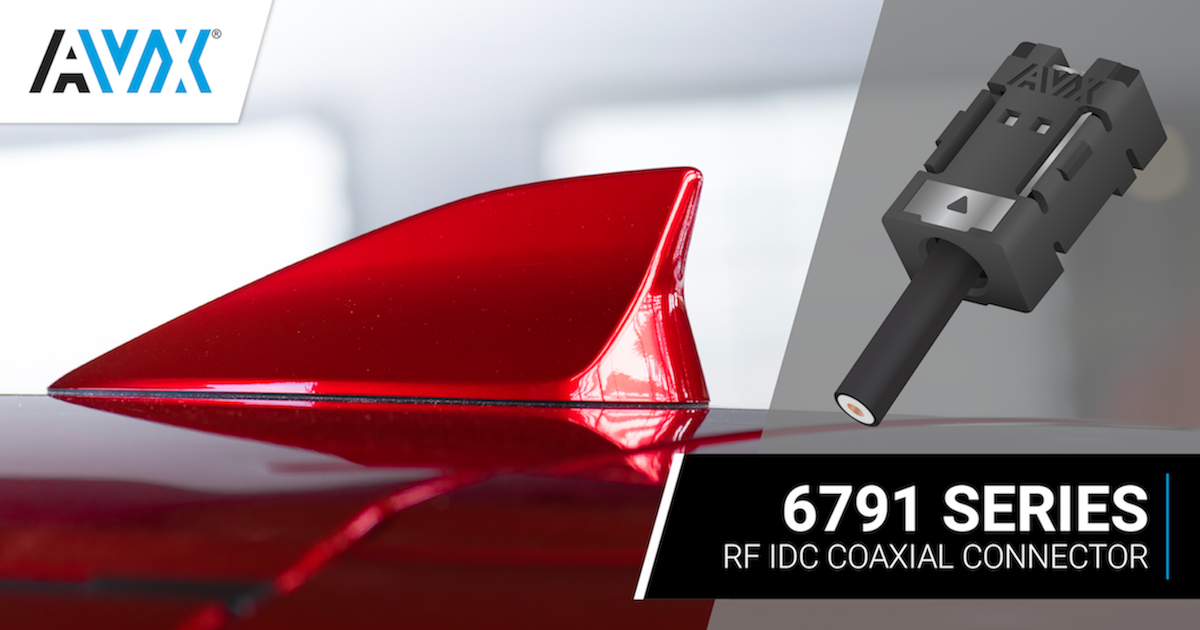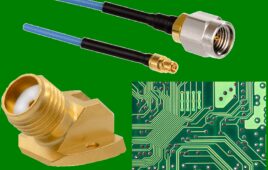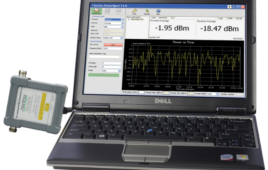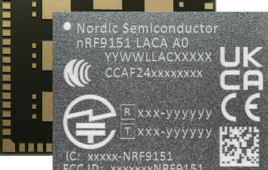AVX Corporation has released the first wire-to-board RF coaxial IDC connectors for industrial and automotive applications. The initial release of the new 00-6791 Series RF Coaxial IDC Connectors is comprised of two small, single-piece solutions suited to different types of coaxial cable and features a patented one-touch coaxial cable termination mechanism that both simplifies the connection process and outperforms competing solutions in terms of size, cost, quality, and performance. The new RF IDC connectors deliver high-quality RF performance that surpasses that of cables soldered directly to a PCB, have a lower component cost and smaller physical size than traditional two-piece RF connectors with comparable performance — measuring down to 10mm x 6.6mm x 3.9mm (L x W x H) when seated, and enable easier, less time-consuming, and less costly assemblies than both soldered connections and traditional RF connectors.
Designed to satisfy demanding automotive and industrial requirements ranging from rugged constructions to space constraints, time savings, and cost efficiencies, the series features mechanical bracing for high-strength performance capabilities and is fully compatible with both automated SMT pick-and-place processing and automated lead-free reflow soldering, which significantly enhances connection quality, reliability, and repeatability and enables employment in the automotive industry, which is fast moving away from hand soldering processes. The new 00-6791 Series RF Coaxial IDC Connectors are also compatible with Bluetooth, GPS, GSM, and WLAN protocols and are rated for 0.5A (depending on the cable), 125VAC operation, 70N of horizontal pull-force, 20N of vertical pull-force, and frequencies up to 6GHz, which makes them well suited for use in a variety of space-constrained industrial, automotive, and consumer market applications including shark fin automotive antennas, smart meters, security access terminals, and industrial automation equipment.
“Our new 00-6791 Series RF Coaxial IDC Connectors are the only product on the market that offers this unique combination of size, mechanical strength, and simplified coaxial termination capabilities,” said Tom Anderson, connector product manager, AVX Interconnect. “Featuring a range of up to 6GHz with nominal return loss and low VSWR, these innovative connectors not only deliver higher-quality and higher-reliability RF performance than more labor-intensive soldered connections; they also deliver comparable performance to traditional two-piece RF connector solutions with footprints and assembled heights that are much better suited for today’s space-critical devices and crowded PCBs, and with a significantly less involved and less costly termination process.”
The termination process for the new RF IDC connectors requires only three simple steps: strip the outer jacket and braid shield, insert the cable with the inner jacket still intact, and manually or automatically depress the insulator cap. This process allows the IDC contacts to pierce the coaxial cable jacket and dielectric and make direct contact with the braid shield and conductor at the same time. Three windows in the series’ insulator caps reveal the position of the cable, enabling visual confirmation of proper termination, and are compatible with camera-enabled automated cable positioning verification systems. Further, should anything happen during the production process that requires the removal of the connector or cable, the caps can be removed to expose the contact tails, which can then be heated and either reworked or removed as well.
Currently available in two versions for different cable sizes, the new 00-6791 Series RF Coaxial IDC Connectors feature phosphor bronze signal and braid contacts, glass-filled Nylon 46 insulators, lead-free tin-over-nickel-plated terminations, and a stainless steel support plate and are RoHS-compliant, supplied in tape and reel packaging, and fully compatible with both SMT pick-and-place machinery and lead-free reflow soldering processes. Operating temperatures for the series extend from -40°C to 105°C, with heat resistance during reflow extending to 260°.





